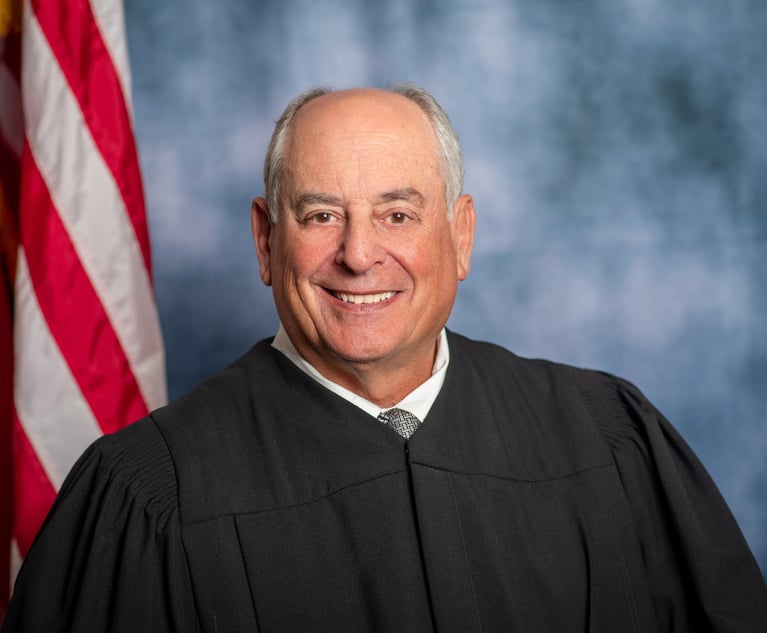 Chief Justice Harold Melton of the Supreme Court of Georgia. (Photo: John Disney/ALM)
Chief Justice Harold Melton of the Supreme Court of Georgia. (Photo: John Disney/ALM)Georgia Supreme Court Lifts Two-Month Suspension of Filing Deadlines Tied to COVID-19
Chief Justice Harold Melton said a backlog of cases has been building at the high court since he declared a statewide judicial emergency in March.
May 21, 2020 at 12:07 PM
4 minute read
Georgia's chief justice will issue a series of orders Thursday lifting most Supreme Court filing deadlines suspended in March when he declared a statewide judicial emergency to mitigate the spread of COVID-19.
Chief Justice Harold Melton said many filing deadlines suspended since March 14 pertain to electronic filings of written documents rather than court proceedings requiring in-person contact.
Beginning Thursday, the Supreme Court will enter specific orders reinstating suspended deadlines in nearly all cases that were pending prior to March 14.
"We have cases that are ready to move," Melton said. "We have the capacity to move them safely. So we will."
The new orders do not revoke deadline extensions for filing new proceedings, including appeals. The statewide judicial emergency — which continues the suspension of all civil and criminal jury trials and bars courts from summoning and impaneling new trial and grand juries — remains in place through June 12.
Effective May 28, parties in pending cases will have the same amount of time to submit court filings as they had when the March 14 emergency declaration took effect. Litigants and their counsel must submit a timeliness certificate with each filing reflecting the new filing deadline. Litigants may seek extensions for good cause related to the COVID-19 pandemic.
The high court has also issued an emergency rule addressing the certificate.
Melton will issue orders directing that beginning May 28, normal filing deadlines will be in effect for most new cases, although litigants may seek extensions for good cause related to COVID-19.
In an interview on the "Good Judge-ment Podcast," Melton said he and fellow justices are now working to "climb out of this crisis."
"We've got to keep the courthouses open because there are certain functions that only the courts can do, … and we have to maintain the baseline functions of what the judicial system is," he explained.
"While this pandemic is upon us, everything is sitting," Melton explained. Meanwhile, he said, a backlog of cases "is just building and building. So, when this pandemic comes to a close, those floodgates are going to open, and anything we can do to mitigate that backlog will be very helpful."
Melton said that under the new order, he wants the courts to "push, but exercise some good judgment," if court appearance and other deadline notices have been delayed.
"These are real tough judgment calls judges have to make," he said. "There are just no good clean answers. That's just the kind of space that we are operating in right now."
But Melton also said that across the state, judges "are ready to work."
"I think they are ready to get to the business of reestablishing order," Melton said. "These judges are mission-oriented. And they feel somewhat at a loss that they are not able to perform their mission. And it's just not sitting well with them. … They are ready to get to work."
Correction: This story has been updated to reflect the order only applies to the Georgia Supreme Court.
This content has been archived. It is available through our partners, LexisNexis® and Bloomberg Law.
To view this content, please continue to their sites.
Not a Lexis Subscriber?
Subscribe Now
Not a Bloomberg Law Subscriber?
Subscribe Now
NOT FOR REPRINT
© 2025 ALM Global, LLC, All Rights Reserved. Request academic re-use from www.copyright.com. All other uses, submit a request to [email protected]. For more information visit Asset & Logo Licensing.
You Might Like
View All
Georgia Supreme Court Honoring Troutman Pepper Partner, Former Chief Justice
2 minute read
'A 58-Year-Old Engine That Needs an Overhaul': Judge Wants Traffic Law Amended
3 minute read
Appeals Court Removes Fulton DA From Georgia Election Case Against Trump, Others
6 minute read
Family of 'Cop City' Activist Killed by Ga. Troopers Files Federal Lawsuit
5 minute readTrending Stories
- 1Split 4th Circuit Revives Constitutional Challenge to Child Vaccine Mandate
- 2Lack of Available Auto Safety Features Does Not Equal Products Liability Act Violation, NJ Appeals Court Says
- 3Riding High, Texas Roadhouse Gives Legal Chief 3-year Contract Extension,15% Salary Boost
- 4New York Times Moves for $100K in Attorney Fees Against Dfinity Foundation
- 5Few Atlanta-Centric Law Firms Expected to Pay Associate Bonuses at Market Scale
Who Got The Work
Michael G. Bongiorno, Andrew Scott Dulberg and Elizabeth E. Driscoll from Wilmer Cutler Pickering Hale and Dorr have stepped in to represent Symbotic Inc., an A.I.-enabled technology platform that focuses on increasing supply chain efficiency, and other defendants in a pending shareholder derivative lawsuit. The case, filed Oct. 2 in Massachusetts District Court by the Brown Law Firm on behalf of Stephen Austen, accuses certain officers and directors of misleading investors in regard to Symbotic's potential for margin growth by failing to disclose that the company was not equipped to timely deploy its systems or manage expenses through project delays. The case, assigned to U.S. District Judge Nathaniel M. Gorton, is 1:24-cv-12522, Austen v. Cohen et al.
Who Got The Work
Edmund Polubinski and Marie Killmond of Davis Polk & Wardwell have entered appearances for data platform software development company MongoDB and other defendants in a pending shareholder derivative lawsuit. The action, filed Oct. 7 in New York Southern District Court by the Brown Law Firm, accuses the company's directors and/or officers of falsely expressing confidence in the company’s restructuring of its sales incentive plan and downplaying the severity of decreases in its upfront commitments. The case is 1:24-cv-07594, Roy v. Ittycheria et al.
Who Got The Work
Amy O. Bruchs and Kurt F. Ellison of Michael Best & Friedrich have entered appearances for Epic Systems Corp. in a pending employment discrimination lawsuit. The suit was filed Sept. 7 in Wisconsin Western District Court by Levine Eisberner LLC and Siri & Glimstad on behalf of a project manager who claims that he was wrongfully terminated after applying for a religious exemption to the defendant's COVID-19 vaccine mandate. The case, assigned to U.S. Magistrate Judge Anita Marie Boor, is 3:24-cv-00630, Secker, Nathan v. Epic Systems Corporation.
Who Got The Work
David X. Sullivan, Thomas J. Finn and Gregory A. Hall from McCarter & English have entered appearances for Sunrun Installation Services in a pending civil rights lawsuit. The complaint was filed Sept. 4 in Connecticut District Court by attorney Robert M. Berke on behalf of former employee George Edward Steins, who was arrested and charged with employing an unregistered home improvement salesperson. The complaint alleges that had Sunrun informed the Connecticut Department of Consumer Protection that the plaintiff's employment had ended in 2017 and that he no longer held Sunrun's home improvement contractor license, he would not have been hit with charges, which were dismissed in May 2024. The case, assigned to U.S. District Judge Jeffrey A. Meyer, is 3:24-cv-01423, Steins v. Sunrun, Inc. et al.
Who Got The Work
Greenberg Traurig shareholder Joshua L. Raskin has entered an appearance for boohoo.com UK Ltd. in a pending patent infringement lawsuit. The suit, filed Sept. 3 in Texas Eastern District Court by Rozier Hardt McDonough on behalf of Alto Dynamics, asserts five patents related to an online shopping platform. The case, assigned to U.S. District Judge Rodney Gilstrap, is 2:24-cv-00719, Alto Dynamics, LLC v. boohoo.com UK Limited.
Featured Firms
Law Offices of Gary Martin Hays & Associates, P.C.
(470) 294-1674
Law Offices of Mark E. Salomone
(857) 444-6468
Smith & Hassler
(713) 739-1250






